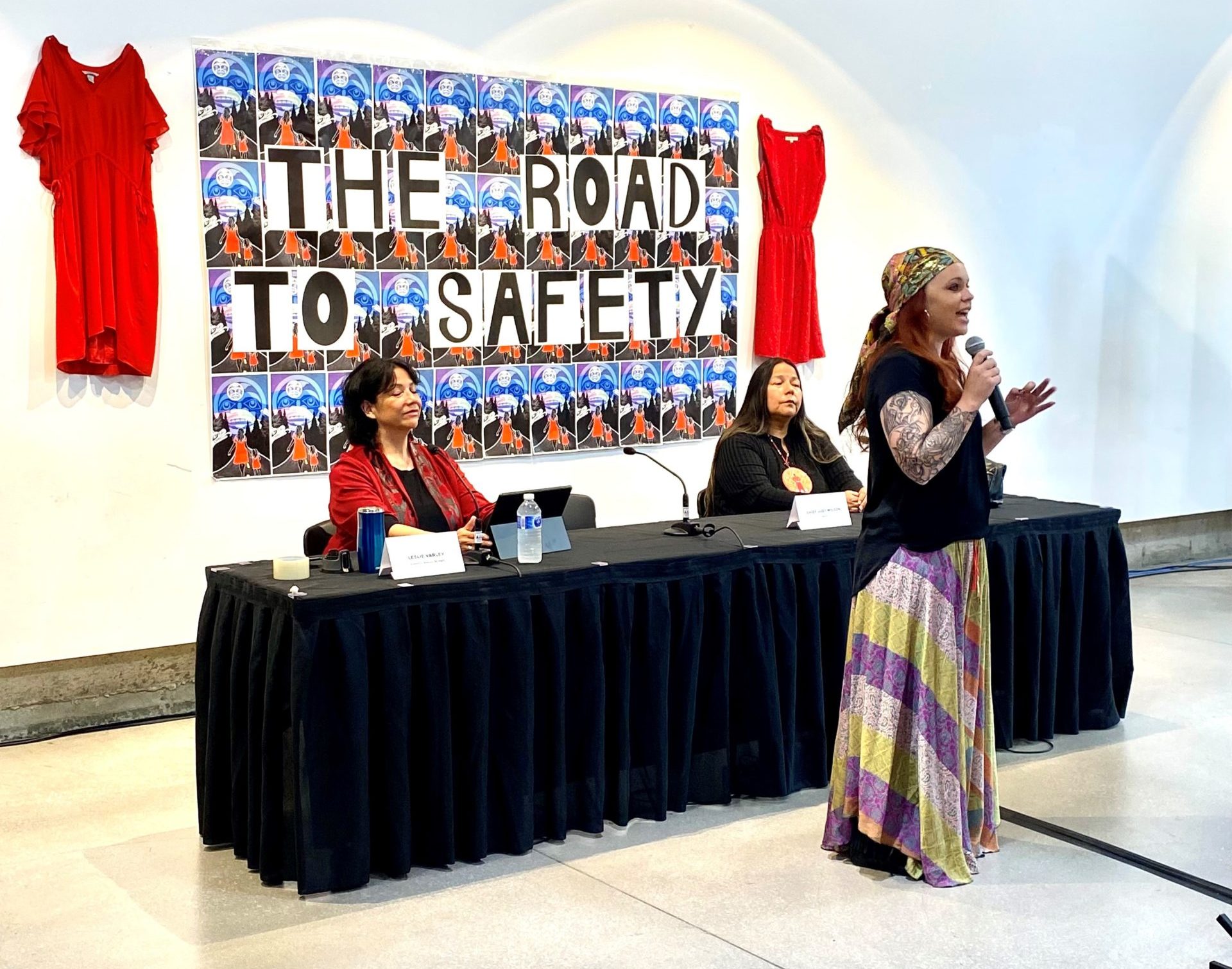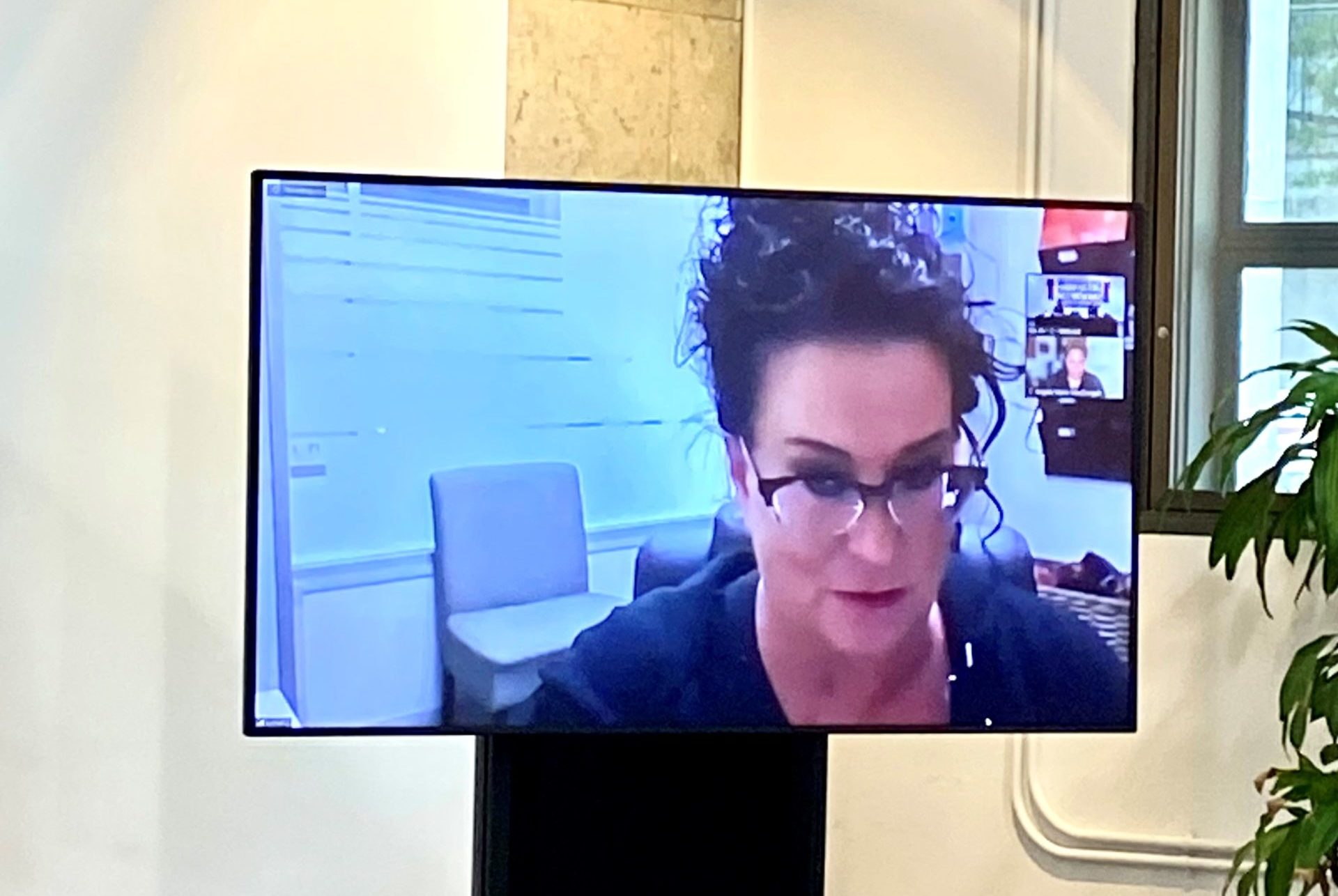
(L-R) Leslie Leslie Varley (BC Association of Aboriginal Friendship Centres), Summer Rain (BWSS), Kukpi7 Judy Wilson (Union of BC Indian Chiefs)
We, at Battered Women’s Support Services, with the BC Association of Aboriginal Friendship Centres are extremely thrilled to announce the release of our much-awaited research project “The Road to Safety: Indigenous Survivors in BC Speak Out against Intimate Partner Violence during the COVID-19 Pandemic.”
In partnership with the University of Victoria and guided by the methodology of “by and for Indigenous women,” our organizations undertook a year-long, community-based research project involving surveys and first-hand interviews with Indigenous women and Indigenous gender diverse people across the province to understand and advocate on their experiences of intimate partner violence people during the pandemic.
We undertook this research because we knew from our frontline conversations with Indigenous women accessing our 24/7 crisis line and our services that they faced novel challenges, on top of pre-existing barriers, to accessing services during the tumultuous times of the pandemic. We are grateful to and raise our hands to the many courageous Indigenous survivors who offered their stories and recommendations to prevent others from experiencing intimate partner violence and to share their vision of a road to safety.
Our research showed 77 percent of Indigenous women and Indigenous gender diverse people surveyed experienced an increase in intimate partner violence during the pandemic. We also found that 67 percent of those surveyed said they faced challenges in accessing services during the pandemic, and about 30 per cent indicated that essential support services weren’t available during that time. Another key finding was that 47 percent of survey respondents did not have access to an Indigenous-run transition home or safe house with culturally safe and relevant supports and services.

Lynnell Halikowski (Prince George Sexual Assault Centre) joined the press conference via video call.
We released the report in a powerful press conference with Leslie Varley (BC Association of Aboriginal Friendship Centres), Kukpi7 Judy Wilson (Union of BC Indian Chiefs), Lynnell Halikowski (Prince George Sexual Assault Centre), and our very own Summer Rain and Angela Marie MacDougall.
In a CBC report, our colleague Leslie Varley highlights how the experiences of Indigenous women and Indigenous gender diverse people feeling intimate partner violence and attempting to access safety and justice shows widespread barriers, fear, discrimination, and isolation. Leslie details in a Global News story, “There’s widespread fear by Indigenous women who are seeking services and its a racism-based fear. They’re afraid they’re going to be negatively judged.” And in the Vancouver Sun, Leslie underscores that, “This is really unacceptable during this time of so-called reconciliation in the province”.
Leslie Varley and Angela Marie MacDougall also joined Gloria Macarenko on On The Coast to discuss the year long project and the report. Listen to the interview here.
Read chapter seven of the report on Engaging and Supporting Men and Boys.
Today, in a powerful op-ed that we published in the Tyee, Summer Rain and Leslie Varley write how:
“Overall, Indigenous survivors who participated in our research project reported experiencing widespread racism. They fear child apprehension and police when reporting violence. They lack accessible and safe housing, transportation, and childcare when fleeing violence. They experience inadequate access to anti-violence services, many of which have growing waitlists and provide culturally unsafe services.
These barriers form an interrelated, entrenched system of oppression for Indigenous women and gender diverse people that amplifies the brutality of intimate partner violence. This means that solutions must be holistic and focused on the full spectrum of violence that Indigenous women and gender diverse people are subjected to – from interpersonal to institutional violence.”
Gendered colonial violence and systemic barriers to safety continue to create a culture of exclusion, with an unacceptable lack of supports available to Indigenous women and their families and glacial inaction by all levels of government to the Calls for Justice by the National MMIWG2S Inquiry. There is a clear and urgent need for more Indigenous-led anti-violence services, safe homes, and transition homes in B.C. We urgently need decolonial, culturally relevant, trauma-informed, feminist support services that ensure the safety of Indigenous survivors of intimate partner violence.
Read more about the five recommendations that participants made on eliminating intimate partner violence.
This is an urgent state of crisis. We thank you for joining us in reading and acting on this report, and for building a road to safety for Indigenous women and girls and and gender diverse people.
For those in the Lower Mainland, we invite you to join us the community launch of the “The Road to Safety” on Friday July 22 at 10 am.




